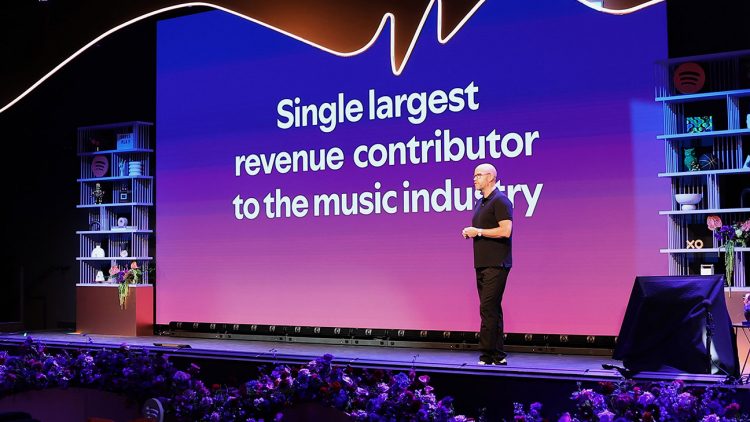Spotify up to date its annual Loud and Clear report on Wednesday, confirming that for a second consecutive yr, the streaming large paid out half of its royalties to unbiased artists.
Of the $10 billion Spotify doled out to music rights holders final yr, it gave about $5 billion to indie labels and artists, the corporate mentioned, a $500 million enhance from 2023.
“It speaks to alternatives and decisions that artists have in the present day,” Sam Duboff, Spotify’s international head of selling and coverage for the music enterprise tells The Hollywood Reporter. “Numerous what streaming and Spotify has enabled is for artists to be in additional management over how they need to navigate their profession. You’ve obtained tons of artists selecting to go the most important label path getting life-changing advances and assets that include that, you see indie labels within the center with a few of those self same providers however artists getting a bigger minimize, then you definitely’ve obtained tons of totally unbiased DIY artists who’re retaining 100% of their royalties and selling themselves.”
The report comes weeks after Spotify introduced its first-ever full yr of revenue, 18 years after the corporate was based in 2006. Spotify launched its Loud and Clear initiative again in 2021 in an effort to extend transparency with artists and contextualize how the streaming service pays for music. Whereas Spotify and the streaming period has helped reinvigorate the file enterprise after years of decline amid rampant piracy within the 2000s, the corporate has acquired constant criticism from artists — notably smaller unbiased artists — about paltry sums for his or her streams.
At the moment’s report doubtless received’t quell lots of these critiques as a majority of the songs on the platform don’t get sufficient streams to even be eligible to get monetized. Spotify additionally irked the songwriter neighborhood final yr over its controversial bundling technique that result in songwriters getting paid a decrease royalty price. The Mechanical Licensing Collective sued Spotify over the bundle technique, although a decide dismissed the go well with in January. Within the new Loud and Clear report, Spotify mentioned it paid out $4.5 billion to songwriters and publishers previously two years.
“The expansion of individuals importing music is all the time going to outpace the expansion price of the variety of folks making it,” Duboff says. “We see our position as offering as a lot transparency and information about our position within the ecosystem as we are able to, and our hope’s been that may encourage extra transparency from different elements of the ecosystem. No different streaming service has revealed clear information about their payouts or what number of artists are producing completely different quantities. Clearly there’s plenty of narratives folks speak about when speaking about royalties, I believe over time the information and details will begin to overwhelm the narratives.”
Spotify’s report is the most recent affirmation for an unbiased music sector drawing extra consideration from the wider music business. On the finish of 2024, Common Music Group, the world’s largest music firm, spent $775 million to amass Downtown Music Holdings, the dad or mum firm to music distribution platforms CD Child and FUGA. And as The Hollywood Reporter reported this week, Harmony is in talks to buy a stake within the music distribution platform Stem as effectively.
Elsewhere within the report, Spotify reported that 1,500 artists have generated not less than $1 million in royalties in 2024, up from 1,350 the yr prior. Spotify mentioned the variety of royalty-generating artists on the platform has tripled since 2017.
Spotify’s replace additionally displays extra international music hitting the mainstream. Music in eight completely different languages generated greater than $100 million final yr, Spotify mentioned: English, Spanish, German, Portuguese, French, Japanese, Korean and Italian. In 2017 it was solely Spanish and English. In the meantime, the languages with the largest development in royalties final yr have been Greek, Telugu, Turkish, Polish and Arabic, Spotify mentioned.
“What we’re seeing is a surge in artists from much less matured music markets capable of faucet into the worldwide royalty pool, and new varieties of music succeeding and careers being attainable that wouldn’t have been conceivable 20 years in the past,” Duboff says.



